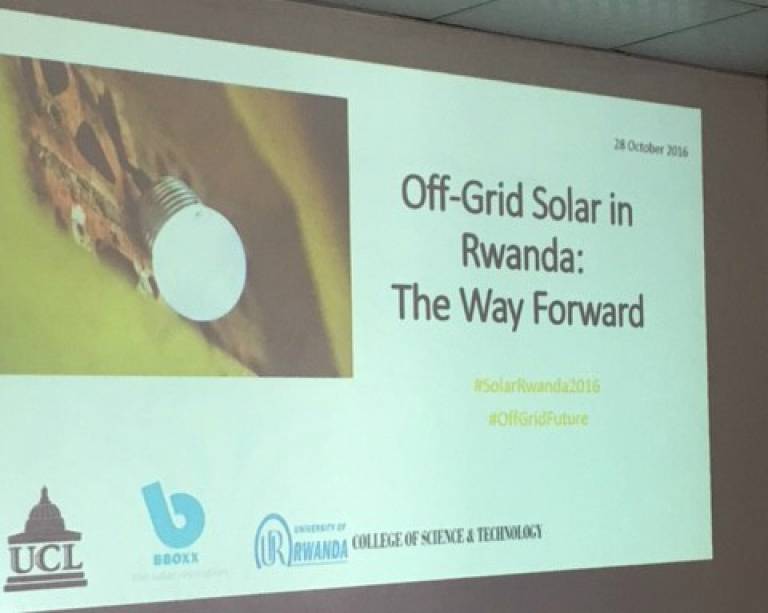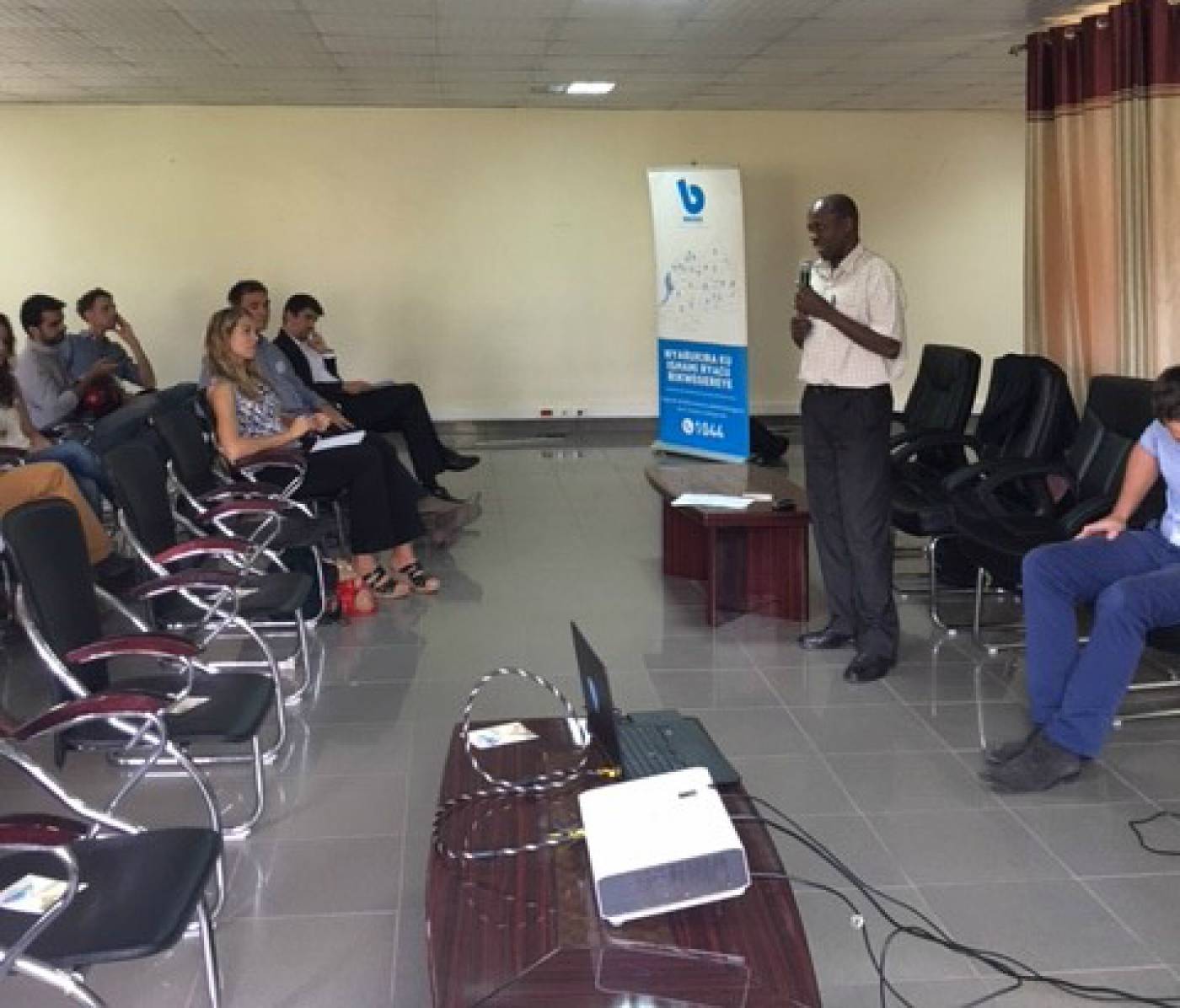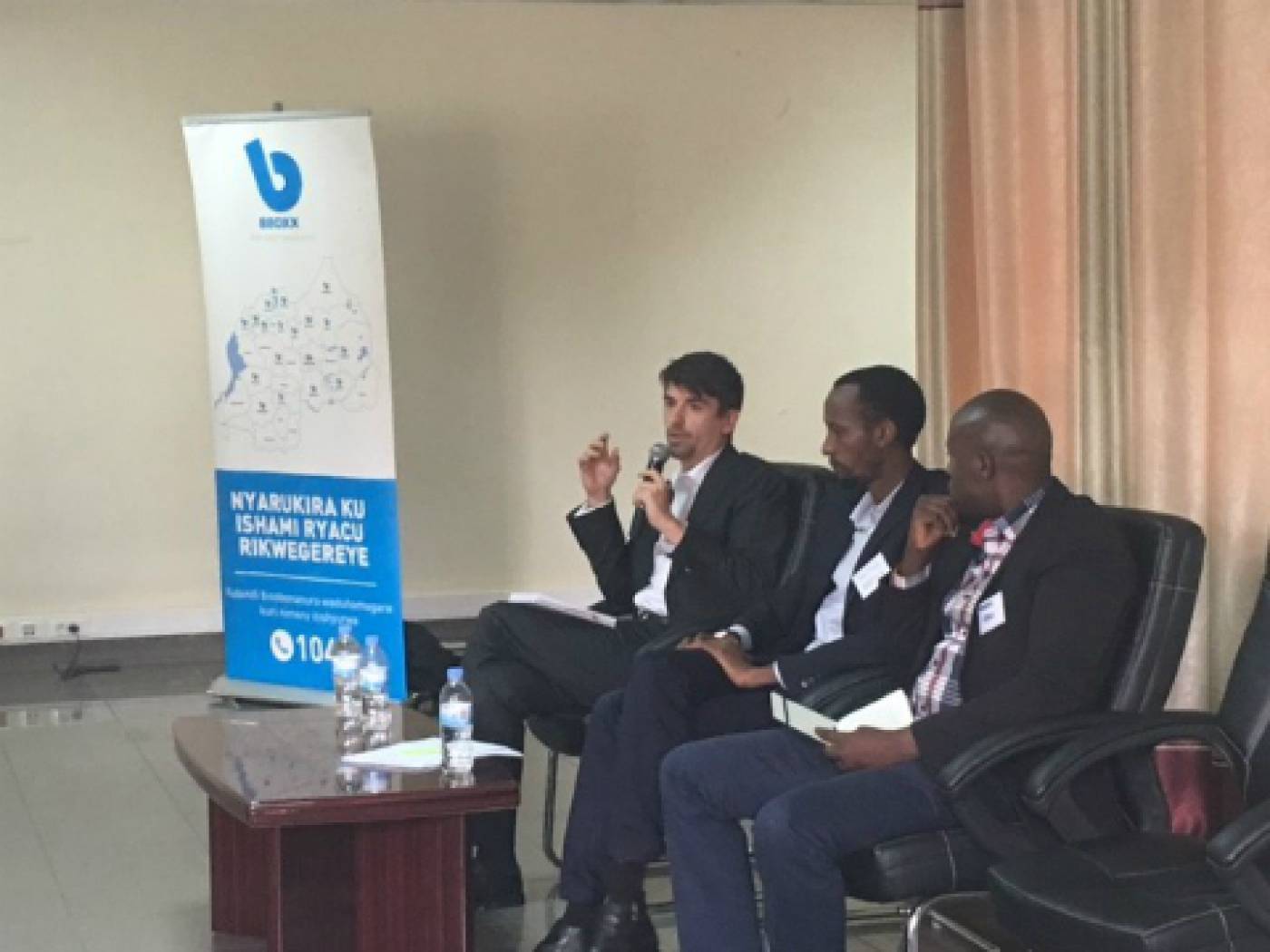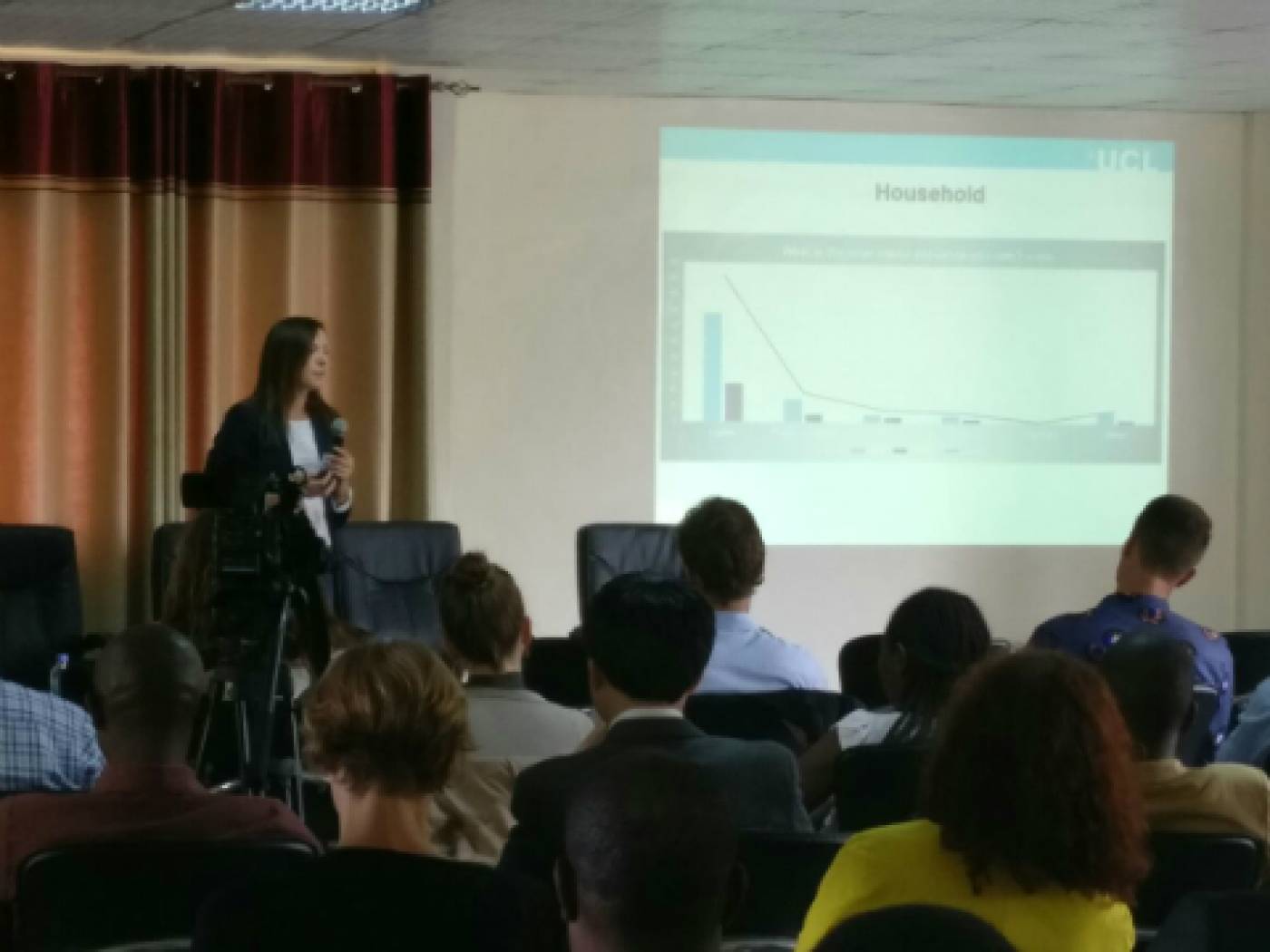UCL graduate student reports on the role of Off-Grid Solar in making electricity widely available in Rwanda
10 November 2016
PhD student Iwona Bisaga based in UCL's Centre for Urban Sustainability and Resilience reports from last month's Off-Grid Solar Seminar examining Rwanda's energy mix and the ambitious vision to increase the country's current electrification rate from 24% to 100% in 2020 .
 Iwona organised the seminar with support
from Professor Ijeoma Uchegbu UCL's Pro-Vice Provost Regional Leadership
Fund for Africa and Middle East.
Iwona organised the seminar with support
from Professor Ijeoma Uchegbu UCL's Pro-Vice Provost Regional Leadership
Fund for Africa and Middle East.
Held on October 28 in the University of Rwanda College of Science and Technology , the Off-Grid Solar seminar, focused on the role off-grid solar plays in Rwanda's energy mix in the context of the Rural Electrification Strategy and the launch of Rural Electrification Campaign lead by the Government of Rwanda.
It brought together key stakeholders from the energy sector to discuss key questions on the future of Rwanda's electrification efforts. Speakers included representatives of the public and private sector, as well as development partners supporting off-grid efforts in Rwanda. I had the chance to present some of the early findings of my research focusing on the users of Solar Home Systems (SHSs) which I am conducting in collaboration with BBOXX- a manufacturer and distributor of solar systems in East Africa.
Universal access

1.3 billion people in the world have no access to electricity and some 600 million of them are in Sub-Saharan Africa. Sustainable Development Goals (SDGs) have set out a target of achieving universal access to reliable, modern energy sources by 2030, which might seem like a long time away but given the relatively slow progress in extending access in places where it's most needed - this timeframe suddenly becomes very tight.
The International Energy Agency estimates that nearly $1 trillion of investment is required to achieve this goal, some $49 billion per year (IEA, 2015). Off-grid solar sector has to date attracted $511 million of investment, according to Bloomberg New Energy Finance report (2016), with Pay As You Go companies hitting a record $160 million in 2015. Still not enough given the capital-heavy nature of the off-grid market.
In Rwanda, where the current electrification rate stands at 24%, rapid scale up will have to happen to reach 70% by 2018, as outlined in the Rural Electrification Strategy, and ultimately 100% by 2020. These ambitious targets will require high levels of investment in addition to the recognition and support given to off-grid electrification, which is supposed to make up 22% of access in the next two years.
According to Morris Kayitare, Director of Primary and
Social Energies Development at Rwanda's EDCL-REG, grid expansion has now
reached all districts, with 100% hospitals, 85% health centres and 92% sector
offices now connected. The pace has been promising, with levels of generation -
from mixed sources including hydropower, thermal and methane gas - growing year
on year.
Challenging landscape

Given the challenging landscape and remoteness of rural populations in Rwanda, off-grid electrification, inclusive of off-grid solar home systems and mini-grids, should not be overlooked. It is now included in the Rural Electrification Strategy and has seen a strong growth in the last few years, with some 50,000 solar systems installed across the country to date, representing 2% electrification. This number will increase rapidly as companies such as BBOXX, Mobisol, and MeshPower continue to scale up.
Laurent van Houcke, the COO of BBOXX, presented the vision the company has for extending energy access to remote rural areas. He also addressed the issue of potential customers living 'under the grid' who choose Solar Home Systems because connecting to the grid network is often too costly for them. With end-to-end digitised operations, BBOXX are hoping for efficient and explosive growth that will allow them to provide reliable energy services in all of Rwanda's 30 districts.
It is expected that off-grid will scale 20 times in the period over the next two to three years, which can only be made possible with adequate levels of financing and investment flows, favourable policies and coordinated efforts among the public and private sector, and the development partners supporting energy work in Rwanda.
Among them, GIZ who are the implementing body of Energising
Development - a multi-donor partnership promoting sustainable access to modern
energy services for households, social institutions and medium-sized businesses
in Africa, Asia and Latin America. In Rwanda, their work currently consists of
three strands: the PSP Hydro promoting the micro-hydro private sector, and the
Results-Based Financing (RBF) for solar lighting and village gird, which is
implemented through Uruwego Opportunity Bank.
Mitigating end-user risk
With a €5 million budget, the RBF facility aims to support off-grid solar companies by offering an incentive to partner companies, based on their sales or village grid installations, which aims at mitigating end-user risk .
Whether one solar light or a village grid, the amount
of the grant depends on the size of the system, which translates into the level
of service provided to the end-user: the more it is, the higher the grant (with
a maximum of €20 per unit sold for solar lighting and up to 70% of the
investment costs in the case of a village grid). RBF subscribed companies can
then use the grant money in any way they deem suitable for their businesses to
grow.
According to Simon Rolland, the Country Project Manager at EnDev Rwanda,
feedback from participating companies has so far been very positive with a high
recognition of the market-driven approach and the suitability of this
initiative for mitigating end-consumer risk, as well as the incentives it
creates for sustainability and performance.
Yet off-grid is not without
challenges in the region, claims Simon, access to working capital and currency
risk remain problematic for the sector and the need for raising local debt
financing is more pressing than ever if the sector is to hit its targets.
Justus Mucyo, the Managing Director of BBOXX Rwanda, has seconded this as being
the key to unlocking the off-grid solar potential in the country during the
panel discussion.
In addition, all speakers agreed that well-defined policy for
the implementation of the Rural Electrification Strategy is of crucial
importance, with badly designed donor or government programmes in the off-grid
space carrying risk for an unfavourable market distortion. Another threat,
particularly to solar systems, are cheaper, poor quality products entering the
market from distributors offering no warranty or after-sales services, which
can have a damaging effect on the users (as well as solar's reputation) as no support
is offered in case systems break.
User needs

The need to focus on end-users and their needs was highlighted
in the early findings of my PhD research which I am conducting on Solar Home Systems (SHS) customers in the Northern part of Rwanda. In order to maintain the overall high
satisfaction levels among those who have adopted SHS, it is important to
recognise that a considerable proportion of them see off-grid solar as a
permanent solution for having access to energy in their households and
therefore the need to provide adequate, reliable services is a must.
All or
most of energy needs are met by SHS for approximately 75% of adopters, however,
majority have aspirations for owning more lights (in order to light up all rooms
in their houses), a TV (for access to information and entertainment purposes),
more phone charging ports (fow own use as well as for income generation), and
other appliances such as shavers, blenders or irons. Worth noticing is the fact
that, based on my findings, women and children are the ones who tend to
use the systems more as they are the ones who spend more time at home, yet it
is usually the man in the household who is the registered owner of the product.
In my research, female users were deliberately targeted in order to better
understand their needs and aspirations as often the primary users of SHS. For
them, having the ability to shift some of the chores into the evening, instead
of early morning hours, and having children stay around the house in the
evening, as well as allowing them to study after dark, is what matters most.
Getting access to appliances which could create opportunities for income
generation, such as shavers to run a barber shop, has been mentioned as desirable,
yet it needs to come at an affordable cost.
Energy targets
One of the most interesting findings was the setting of
energy targets, or imihigo, as they
are known in Rwanda (literal translation of imihigo
is performance targets), at the household level. Over 40% of SHS users
interviewed have reported having energy targets in their households at the time
of purchasing their systems. Well over 50% have reported there being energy
targets at the umudugudu (village)
level now. Such grassroot, bottom-up energy planning is quite unique and not
commonly seen among households in countries lacking energy access.
The significance of this approach should not be overlooked, knowing that households and villages set such targets could help SHS providers better target future customers and improved understanding of how households decide to set and execute their energy imihigo could be a valuable learning for other countries with high proportions of those still living off the grid.
Listening to customers' voices and collecting their feedback for service
improvement, financing and sound policies, as well as closer collaboration
among all stakeholders involved, dominated the discussion between the speakers
and the diverse audience, among whom were EU delegates, banks' and telcos'
representatives, Power Africa, DfID, EPD Rwanda, Mobisol, as well as students
from UR-CST.
A great addition to the planned talks and discussions was the announcement of the African Centre of Excellence in Energy for Sustainable Development by Professor Etienne Ntagwirumugara of UR-CST. The Centre is being established under World Bank's Eastern and Southern Africa Higher Education Centres of Excellence Project (ACE II) and is supported by the governments in the region. Prof. Ntagwirumugara called for cooperation and local partnerships, particularly with the private sector in the energy sector with whom the Centre aims to work closely in order to train future leaders and equip them with skills which are most needed for the sector to thrive.
Useful links
Iwona Bisaga, PhD Student, UCL Centre for Urban Sustainability and Resilience
 Close
Close

